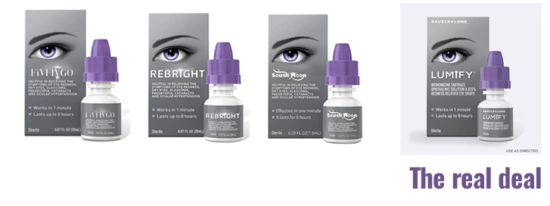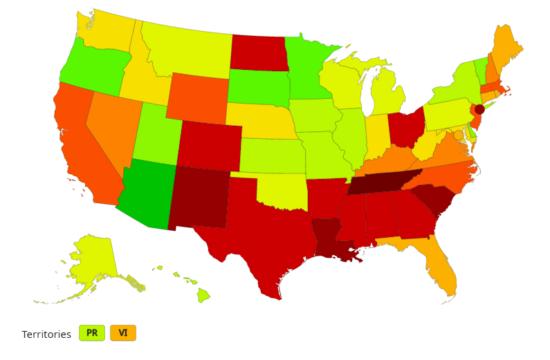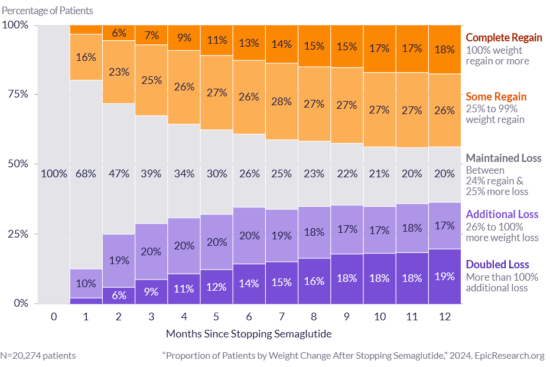February 15, 2024 ✒ Andrew Kantor
There are three versions of the RSV vaccine — one for pregnant women, one for infants, and one for people over 60. Apparently there have been at least 143 members of the first two groups who were given the vaccine for the over-60 crowd. There were only some minor complications (“adverse events”), but worth noting is that most of the mistakes were made “in outpatient settings or pharmacies,” so be sure to double-check those vials. An elderly, immunocompromised man is the first person to die from a newly discovered virus: Alaskapox. It was first identified in 2015, and so far there have been just seven cases. The man who died likely got it from a stray cat he was caring for — a cat that hunted small animals that carry the virus, and that had scratched the man. You know they’re a bit flummoxed when this is all the advice they can give: Health officials said there hasn’t been any documented cases of humans passing on the virus but they recommended people with skin lesions possibly caused by Alaskapox to cover the affected area with a bandage. Novo Nordisk has settled two of its 12 lawsuits against spas, health centers, and compounding pharmacies for claiming they were selling Ozempic® or Wegovy® when they were in fact using compounded versions. In this case it was two spas — Cosmetic Laser Professionals Med Spa and Nuvida Rx Weight Loss, both in Florida. The issue wasn’t that the clinics were selling compounded drugs — that’s completely legal — it was that they were claiming to be providing the brand-name stuff. “[The companies] are immediately barred from claiming that their compounded drugs have approval from the U.S. Food and Drug Administration, Novo Nordisk said.” Well, they never were legally allowed to say that, so they’ve now pinkie-promised to obey the law. They are also forbidden from “misleading” advertising and using any Novo Nordisk trademarks or logos in their products. Again, ditto — that’s kind of Trademark Law 101. The Pharmaceutical Research and Manufacturers of America had its lawsuit challenging the legality of Medicare price negotiations tossed out of a federal court. The suit wasn’t dismissed because of its merits (or lack thereof). Rather, the judge said the court “lacked jurisdiction to hear its claims because they arose under the Medicare Act and could only be heard by a court following an administrative review by the agency.” So first Medicare has to review the law, then maybe PhRMA can sue. Still, it’s the second loss for PhRMA on the issue. For the first time since 2021, the CDC is telling people they don’t have to isolate for five days if they test positive for Covid-19. Now they can go back out once they’re feeling better … well, almost. Under the new approach, people would no longer need to stay home if they have been fever-free for at least 24 hours without the aid of medication and their symptoms are mild and improving. Stopping an overdose with 4 mg of naloxone is just as effective as using 8 mg. So found a study out of Albany (NY) Medical College, based on 354 cases of state troopers giving the nasal spray in rural areas of the state. “What was really remarkable was the survival was the same, but the amount of withdrawal symptoms* was significantly larger in the people that got the 8-milligram dose.” * “[V]omiting, abdominal pain, sweating, shaking, and diarrhea.” Vanoxerine was developed to help treat cocaine addiction, but here’s a twist: It might also work to fight colon cancer. What Canadian researchers found is that it “packs a powerful punch when suppressing cancer stem cell activity.” In practical terms that means vanoxerine can make tumors more susceptible to the immune system by rewiring some genes leading to “reactivation of ancient viral DNA fragments” that the immune system can hone in on. So far this has only been tested in animals and in vitro with human cells, but still, “This finding is quite significant, considering that colorectal tumours tend to show poor response to standard immunotherapy.” We talk a lot about the effects of gut bacteria on … well, on everything. But what about gut viruses? Maybe they haven’t been getting their due. There’s plenty of evidence that transferring the gut bacteria of a healthy person into an unhealthy one can do a lot of good, but now scientists in Ireland have tried the same thing with viruses, specifically bacteriophages. Phages are viruses that kill bacteria, but they’re targeted — each phage kills a particular germ. So transferring phages from one person (or mouse) to another effectively changes their gut biome once the phages start killing. In the case of the Irish research, they tried transferring phages from chill, relaxed mice into stressed-out rodents. And what happened? “The research […] suggested these transplants reduced levels of stress hormones and curbed depression- and anxiety-like behaviour in the mice.” Is this a lot different than transplanting the bacteria directly? Probably not, but it shows there are multiple paths to the same goal — and that gut bacteria can affect stress levels.PhRMA suit tossed, addiction drug treats cancer, not-so-useful Alaskapox advice, and more
Wrong RSV shot
ICYMI: Alaskapox takes first victim
Legal news
Novo settles a couple of semaglutide suits
Judge tosses PhRMA suit against price negotiations
CDC loosens Covid-isolation recommendations
Higher-dose naloxone doesn’t do more
The X-for-Y Files
Healthy viruses, lower stress
February 13, 2024 ✒ Andrew Kantor
Chain pharmacies are having a bit of trouble finding enough pharmacists, which is especially a problem as they look to expand the kinds of health services they offer. You could blame burnout, but that’s actually only one part of the problem. The bigger issue is the pipeline, and how it’s not looking good for future hiring. There’s been a steady drop in applications to pharmacy schools, falling 64% from nearly 100,000 in 2012 to about 36,000 in 2022, according to the American Association of Colleges of Pharmacy. To help fill that pipeline, chains are looking at restoring pharmacy’s reputation as an attractive career, and one that commands a lot of community respect. And yes, they’re clear on the workload issue. They’re actually hoping to solve two problems at once: “Expanding the services that pharmacists provide, while cutting down other workloads” to attract students. (One tack is working with pharmacy schools to change how students are trained — they’re looking at more “comprehensive education around the business of health care.”) Antidepressants can be hit-or-miss, and it can take a month or two to determine if a particular one will work for a patient. Unless, of course, you ask an AI to look into it. Our soon-to-be machine overlords are better at parsing patient data, and Dutch researchers found theirs takes only about a week to tell whether a drug is working. (Well, at least sertraline — that’s all they’ve tested it on so far.) It uses a combination of brain scans and patients’ reported symptoms. After a week on the drug, the AI takes into account basic patient data and the blood flow to the anterior cingulate cortex to determine how well the sertraline is working. The severity of symptoms — or lack thereof — confirms it, meaning less time taking a drug that doesn’t help. “With this method, we can already prevent 2/3 of the number of ‘erroneous’ prescriptions of sertraline and thus offer better quality of care for the patient.” A new antibiotic for urinary tract infections — GSK’s gepotidacin — did so well in its phase-3 trials that they stopped the trials. Gepotidacin was better than nitrofurantoin, and especially “in patients with uUTIs caused by Escherichia coli, including drug-resistant phenotypes of clinical importance.) Science, if you’re interested: “[G]epotidacin is a first-in-class triazaacenaphthylene antibiotic that inhibits bacterial DNA replication by a novel mechanism of action.” When it’s time for someone with diabetes to move beyond metformin, what patients want may not be the same as what prescribers think they want. A University of Maryland study found that doctors tend to think “This medication will lower your glucose and A1C.” Meanwhile, what patients need to hear is “This medication will keep you from dying or going blind.” In other words, it might be a good idea to tweak the message to include the broader implications — “that it is not just glycemic control that is important but glycemic control in the context of a healthy lifestyle and good overall health.” Fun fact: Topping patient concerns was preventing blindness (63% called it “very important”), while preventing death was in second place (60%). Take from that what you will. Not only does a cancer drug fight cancer (as you would expect), but it seems that when you combine it with its byproduct, you get an even better cancer drug. The original drug: Rucaparib (for recurrent ovarian, breast and, prostate cancers) The metabolite by-product: M324 Combining the two: That “increased cancer cell inhibition more than using either compound singly. The biggest difference was seen in the prostate cancer cell line, with a difference in inhibition exceeding 30%.” But wait, there’s more! What about M324 on its own? Why that turns out to be a potential treatment for Parkinson’s. They found that the metabolite effectively reduced the accumulation of ⍺-synuclein, a protein that, when misfolded into aggregates, causes neuroinflammation, neurodegeneration and cell death. It’s been linked genetically and neuropathologically to Parkinson’s disease. Facebook parent Meta is, at least for the moment, cracking down on ads that violate its policy against … geez, who knows? The ones that go against its “social, election, or political ad policies” — that is, whatever the AI thinks make the platforms less “safe.” Meta’s safety team at work The point is that more pharma companies are seeing their ads flagged by the Meta algorithm and removed, even when they’re benign or even positive. Those included a Gilead ad about education equity in local communities, one from Sanofi with an AI avatar, and several from ViiV Healthcare featuring R&D chief Kimberly Smith discussing topics like HIV status and health inequities. It seems that Meta doesn’t want ads that “addressed social issues like equity, LGBTQ+ community support, or environmental concerns” because that would, in some world, make Facebook and Instagram less safe. That Gilead ad? It was about the company’s Creating Possible Fund, “which promotes education equity for disadvantaged students in local communities.” It was allowed back up once the word “Sponsored” was replaced by “Paid for by Gilead Sciences Inc.,” which is apparently … safer? Officially, Covid-19 has killed about 1.2 million Americans since the pandemic began. But that, Boston University public health researchers say, is almost certainly a big undercount. Their logic is simple and backed by data: They looked at deaths from natural causes reported during the pandemic (to eliminate accidents, homicide, and suicide) and compared those numbers to previous years. What they calculated is that Covid deaths may have been undercounted by almost 14%. That is, 14% of excess deaths during the pandemic didn’t have Covid-19 listed as the cause, and it was more prevalent in areas where “political biases or stigma around Covid may have affected whether Covid-19 was listed on a death certificate.” But could these excess deaths have been causes by delayed care thanks to overcrowded hospitals? Or maybe — as some conspiracy theorists claim — from the vaccine (or Bill Gates’s microchips)? Nope. The excess deaths tracked with Covid deaths, i.e., if it was a vaccine reaction or another cause, they wouldn’t have aligned with Covid peaks and valleys. Pharma ads unsafe for Facebook, the slowing pharmacist pipeline, valuable chemo byproduct, and more
It looks like a good time to be a student pharmacist
AI and antidepressants
New antibiotic targets UTIs
The right diabetes-drug message
A drug from the leftovers
Facebook’s algorithm is hitting pharma ads

Covid deaths are higher than we thought
February 10, 2024 ✒ Andrew Kantor
Viagra might reduce your risk of Alzheimer’s. That’s what British pharmacoepidemiologists (!) found after a five-year study involving almost 270,000 men with erectile dysfunction. It’s not proof that ED drugs actually prevent dementia, but there’s definitely an association; Men taking ED meds were about 18% less likely to develop Alzheimer’s than those not taking them. Keep in mind that the incidence of dementia were low, so that’s 18% of a small number. But still, as one researcher put it, “These findings cautiously allude to greater benefit” of the medication. There’s only about two weeks to sign up for the February 25 session of APhA’s Pharmacy-Based Immunization Delivery: A Certificate Program for Pharmacists at the GPhA World Headquarters in Sandy Springs. This is the nation’s Godzilla* of immunization training — the one that puts all other courses to shame (and occasionally crushes them beneath its metaphorically feet). It gives 20 hours of CE credit, a spiffy certificate for your wall, and the impressive line on your CV. The whole shebang is just $349 for GPhA members ($499 for non-members). * Yes, yes, it’s “Gojira.” Not enough people understand that, though. Melissa Reybold is at it again at the capitol, and she’s got her latest update to show for it. Check it out to stay in the know about what’s happening under the Gold Dome. Actually, they’re not just more susceptible, they’re a lot more susceptible — and now Stanford Medicine scientists think they know why. It’s all about that extra X chromosome that women carry. Two X chromosomes could produce double the amount of certain proteins, and that would be bad. That’s why women’s bodies have a way of shutting it down: a molecule called Xist that causes X-chromosome inactivation. But it seems that while Xist is preventing one of those X chromosomes from pumping out proteins, it’s also generating “long noncoding RNA molecules” that end up attracting bits of proteins and even DNA. That clumping can cause an autoimmune reaction. They tested their hypothesis by inserting the Xist-making gene into male mice. In these susceptible mice, males in which the Xist gene was activated developed lupus-like autoimmunity at a rate approaching that of females — and considerably more so than non-bioengineered males. They’re hoping this discovery can at least lead to earlier detection of autoimmune disorders … at least in women. When it comes to What causes ___?, if you bet on “gut bacteria” you’ve got a good chance of getting it right. Such is the case with catching a respiratory virus and how severe it is. Georgia State researchers found that mice with segmented filamentous bacteria (SFBs) in their guts had a lot more protection against Covid-19, flu, and RSV. The bacteria, they found, altered immune cells in the lungs — alveolar macrophages — so they weren’t depleted as quickly and didn’t cause inflammation. Sure, these are mice, and SFBs are only found in rodents, fish, and chickens. But they’re related to Clostridium, so it’s possible there’s a human equivalent. As always, more research is needed. After Thursday’s story about Naloxone being free for everyone (either via a Medicare/caid or a Pfizer coupon, a “concerned independent pharmacy owner” wrote in with just a teeny bit of sarcasm to explain why indy pharmacies might not be in a hurry to offer Paxlovid: I feel we should also spotlight the fact that 90%+ of insurance companies are reimbursing BELOW the cost of Paxlovid. We should spotlight how BELOW COST reimbursement is a HUGE incentive for independent pharmacies to stock/dispense Paxlovid. [eye roll] Big Pharma and its coupon cards are here to save the day and continue the efforts to put independents out of business. Back in August 2023 we reported on a study that found that getting a Covid vaccination and booster in the same arm was better than getting one in each arm — switching arms resulted in more killer T cells than being “unilaterally” vaccinated. Now the twist: A different study, this one out of Oregon Health & Science University, found just the opposite. Researchers there report “as much as a four-fold increase in immune response when people alternate from one arm to the other when given a multi-dose vaccine.” “By switching arms, you basically have memory formation in two locations instead of one,” said the senior author. So which is it? You know the answer: More research is needed. The FDA is considering announcing in April that it might consider banning the chemical in hair-straightening products — after further consideration, of course — because the agency says it’s linked to reproductive cancers. What’s odd is that scientists who know these things say that formaldehyde is linked to other cancers, but not reproductive ones. It shouldn’t be in hair products, but not for the reasons the FDA says. And other scientists point out that it’s more than formaldehyde that makes hair straighteners dangerous: Studies have shown that straightener ingredients include phthalates, parabens, and other endocrine-disrupting compounds that mimic the body’s hormones and have been linked to cancers as well as early puberty, fibroids, diabetes, and gestational high blood pressure. So this ban seems like a good idea, although it’s taken the FDA a long time to get here … and then they arrived for the wrong reasons. In the richest, most powerful country in the history of the world, health professionals have begun suggesting that patients beg for money to pay their bills. Resorting to crowdfunding to pay medical bills has become so routine, in some cases health professionals recommend it.Lupus and the X factor, Viagra’s next trick, GoFundMe for bills, and more
Gentlemen: Protect your big brain
The class is filling
Your next legislative update

Learning the “why”
Why are women more susceptible to autoimmune diseases?
Why do respiratory viruses hit some people harder?
A reader weighs in
Vaccine arm twist
Formaldehyde ban coming?
Let’s just take this in
February 08, 2024 ✒ Andrew Kantor
People are being overcharged for Paxlovid, and HHS wants pharmacists to help it stop. Sure, the list price of Paxlovid is $1,400, but no one should be paying that — Pfizer has co-pay assistance programs. The trouble is that (at least anecdotally) some pharmacy staff aren’t telling patients about that option. Health and Human Services Secretary Xavier Becerra “made it clear that no patient should be charged hundreds of dollars for Paxlovid at the pharmacy counter,” according to a readout of this week’s meeting with leaders from CVS, Walgreens, Walmart, Rite Aid and Kroger. The Biden administration has an agreement with Pfizer that no one should be paying at all for Paxlovid. “Medicare and Medicaid enrollees can receive Paxlovid for free through 2024, and uninsured individuals can receive Paxlovid for free through 2028.” There’s likely nothing sinister going on here; staff may simply be unaware of the options, and HHS wants to make sure that changes. First they were for diabetes, then for weight loss. Now at least two of the new GLP-1 drugs have yet another effect: According to Eli Lilly, they can also reduce blood pressure. It’s tirzepatide specifically that the company says cuts BP, and it’s a Goldilocks dosage: Participants taking 10 milligram doses of tirzepatide had the greatest systolic blood pressure reductions (10.6 points), followed by those on 15 milligram doses (8.0 points) and participants on 5 milligram doses (7.4 points). The big caveat: “[T]he researchers aren’t sure if the drop in blood pressure was only due to tirzepatide, or if weight loss and diet change had an effect, as well.” And of course there’s the obvious connection to weight loss. There’s a link between body temperature and depression. It seems (found UC San Francisco psychiatric researchers) that “with each increasing level of depression symptom severity, participants had higher body temperatures.” They don’t know whether depression somehow causes temps to rise, or if a rise in temperature is a factor in depression. What they do think is that there might be a benefit to cooling the bodies of people suffering from depression — by heating them up. A small body of existing, causal studies has found that using hot tubs or saunas can reduce depression, possibly by triggering the body to self-cool, for example, through sweating. But you know the mantra: More research is needed. AIP folks were out in Griffin on the latest leg of their “DIR Hangover Tour” — VP Jonathan Marquess and Member Service Rep Catherine Daniel headed to Wynn’s Pharmacy where they met with co-owner and AIP board member Annette Duncan, PharmD, and talked about the solutions and programs AIP offers independent pharmacies. Co-owners Brett and Annette Duncan; MSR Catherine Daniel; Jasper Eubanks, PharmD; and AIP VP Jonathan Marquess Catherine and Annette talk about indy pharmacy issues This isn’t something you hear often: The HPV vaccine had a 100% success rate. That was in a study of Scottish women, and not a small one, either. It’s based on women who received the vaccine when they were 12 to 13 years old, starting in 2008. The researchers looked at cancer data in 2020, so that’s 12 years cancer free. To be extra-super clear: “[T]here have been no cervical cancer cases to date in fully vaccinated women who were given their first dose at age 12-13 years.” Wow. A Johnson & Johnson employee is suing the company saying it “didn’t make enough effort to get its workers a good deal for prescription drugs,” meaning employees ended up overpaying to the tune of millions of dollars. J&J essentially self-insures rather than paying an insurance company to manage health benefits, which means it falls under the Employee Retirement Income Security Act, aka ERISA, which means it has “a fiduciary duty to prudently manage the funds.” The lawsuit alleged J&J violated the company’s fiduciary duty under ERISA. J&J’s mismanagement of the drug benefits resulted in “higher payments for prescription drugs, higher premiums, higher deductibles, higher coinsurance, higher copays, and lower wages or limited wage growth,” the lawsuit said. As a publication that relies on scientific papers a lot, this is scary stuff. Fake scientific papers — many from China where they take “publish or perish” to an extreme — are flooding academic journals “as increasing numbers of young scientists try to boost their careers by claiming false research experience.” You might think the responsibility to verify work falls on journal editors and reviewers, but they’re only part of the problem. Even honest researchers can inadvertently cite falsified work in their own reviews, meaning the problem spreads. Worse, the result of a fake study can make it into the mainstream. Ivermectin is a great example: Early laboratory studies indicated it could be used to treat Covid-19 and it was hailed as a miracle drug. However, it was later found these studies showed clear evidence of fraud, and medical authorities have refused to back it as a treatment for Covid. Oh, and while it’s easy to blame the problem on Chinese “paper mills,” it’s bigger than that. Check out “The Harvard Professor and the Bloggers” to learn how pervasive fake research is. To get more people to test for sexually transmitted infections, the Brits have experimented with vending machines that offered STI tests. They installed 11 of the machines in two medium-sized cities* and let them do their dispensing thing for a year. These machines dispensed rapid HIV tests and self-sampling kits for other STIs, and the results were quite promising. According to the study, the vending machines were found to be effective and acceptable, especially for individuals who rarely or never get tested. By “effective” they mean the machines dispensed 2,536 kits, and users seemed satisfied: “An impressive 92% of respondents found the machines user-friendly, and a whopping 97% were willing to recommend the service to others,” (We assume that means “Honey, why don’t you use that machine over there before we get * Bristol in the southwest and Brighton and Hove on the south shore, since you askedWhen depression is hot, the 100% vaccine, a twist on drug-pricing suits, and more
Reminder: Paxlovid is free for patients
Eli Lilly: Mounjaro And Zepbound reduce blood pressure, too
People with depression are hot
AIP out and about


HPV vax: 100% success
Is this irony? It might be irony
The fake-research problem
Elsewhere: Brits’ new vending machines
coffee tea?”)
February 06, 2024 ✒ Andrew Kantor
Covid, flu, and RSV activity has been declining for several weeks, but now flu numbers have started to creep up again. And guess which state is on the short list of those with very high activity? Also: CDC estimates that there have been at least 20 million illnesses, 230,000 hospitalizations and 14,000 deaths from flu so far this season. Perspective: That’s the equivalent of having 93 Boeing 737s crash with no survivors — just this season. From the flu. (That’s almost six plane crashes every week.) There’s a new variant of Covid appearing, in case you need to fill a space on your bingo card. This one’s called BA.2.87, and “is probably the most divergence [sic] lineage identified this year.” During the pandemic, the feds made it easier for HHS (specifically the Substance Abuse and Mental Health Services Administration) has now made that rule final — the first time in 20 years there’s been a change like this. Patients will be able to take methadone home, and they’ll be able to start getting methadone or buprenorphine via telehealth rather than in person. Federal health officials cited reports that those flexibilities increased treatment and patients’ satisfaction with their care without notable increases in diversion of methadone, which itself is an opioid. Pregnant women who for obvious reasons want to get off opioids are slightly better off using buprenorphine than methadone, according to a study out of Harvard’s and Stanford’s schools of medicine. Both, of course, are better for the baby than taking opioids, so if methadone is the only option, methadone is what they should take. In three quarters of cancers, a protein called MYC is like a nitro boost for tumor cells. As a UC Riverside researcher put it, “Normally, MYC’s activity is strictly controlled. In cancer cells, it becomes hyper active, and is not regulated properly.” Not regulated properly? Challenge accepted. The issue is that MYC is kind of shapeless, so it’s hard to find a structure to attack with drugs — it’s like trying to get a stranglehold on the Blob. But the Riversidians have developed and improved a peptide that binds to MYC using (as you may have guessed) sub-micro-molar affinity. Once the peptide is in the cell, it will bind to MYC, changing MYC’s physical properties and preventing it from performing transcription activities. They need to work on the delivery system before they can start on the road to making this into an actual drug that might keep tumors at bay. When someone is hospitalized for schizophrenia, they’re often given antipsychotics when they’re discharged. Those can be in the form of a long-acting injection or a daily pill. But it seems that taking the pills is four times more likely to lead to readmission. After 30 days, the readmission rate was 8.3 percent among patients who received oral medication and 1.9 percent among patients who received long-acting injections, which can last anywhere from two weeks to six months. That’s what Rutgers researchers found in a new study of 30-day readmission rates at one hospital. Sure, current treatment guidelines say that injections are preferred, but patients often opt for pills instead for either financial reasons (i.e., insurance coverage) or simple fear of needles. But would they still make that choice if they knew how big the difference was? PediaSure can help kids grow taller according to its maker, Abbott. Heck, it’s “clinically proven”! But a New York City grandmother is suing the company, saying that not only is that nonsense, but that the company knew it too. (She “cited three studies funded by Abbott itself that found no connection between PediaSure and growth in height.”) Grandma says all PediaSure did was make her grandson overweight. Abbott said the case was without merit, but a judge said there was certainly enough evidence that it could go to trial. Get your popcorn. Warning: Adults only, please. What do you get when you mix screwy medical advice, conspiracy theories, anti-Semitism, misogyny, and probably a bit too much time on 4Chan? You get the anti-masturbation movement. No, seriously.The latest kooky health movement, flu resurges, easier opioid treatment made permanent, and more
Flu gets a second wind
Covid note
Opioid treatment rules relaxed
opioid addicts people addicted to opioids to get the treatment they needed. They relaxed the rules so patients didn’t need to see a provider in person to get methadone or buprenorphine.Speaking of opioid addiction
Blocking tumors’ accelerator pedal
For antipsychotics, a needle beats a pill
Lawsuit to watch
Write on
The Non-Pharm Long Read: Oh Come On edition
February 03, 2024 ✒ Andrew Kantor
The FDA is warning about eye drops that are essentially copies of Bausch + Lomb’s Lumify. The packaging is suspiciously similar, and these drops could be contaminated. The brands: FivFivGo, Rebright, and South Moon. The South Moon eye drops were contaminated with Burkholderia cepacia complex, a group of bacteria that could result in an antibiotic-resistant infection. While Rebright testing was negative for contamination, FDA recommends consumers not use this product. Oh, and at least two of them, despite looking like Lumify, were missing the active ingredient. And to raise your eyebrow a bit more, the agency says, “The origin of these products is currently unclear.” And when we says they look like Lumify, we don’t mean there’s a passing resemblance: After all the hullaballoo about Biogen’s Aduhelm med for Alzheimer’s — did it really work? was it worth the $56,000/year price tag? — those worries are gone. Biogen has pulled it from the market. The biotech company will focus on rolling out Leqembi, a newly approved Alzheimer’s drug it developed with Japanese drugmaker Eisai. It also plans to work on a slate of experimental treatments for the disease. * * * Got a salmonella infection in your GI tract? You could of course take antibiotics, or you can slap yourself on the forehead and say, “I could have had a V8!” Tomato juice, it seems, can kill salmonella in the gut thanks to a couple of antimicrobial peptides that destroy the bacteria’s membrane. The researchers said they hope that when the general public, particularly children and teenagers, learns about the outcome of the study, they will want to eat and drink more tomatoes, as well as other fruits and vegetables, because they provide natural antibacterial benefits. In what is likely a shock to absolutely no one, a new report found that… The gross price of insulin in the United States is more than nine times higher than in 33 high-income comparison nations. What was that the pharma companies said about high prices were to pay for R&D? Insulin is 100 years old. Ah, but what about the actual price that’s paid after rebates and kickbacks? Yeah, we’re still getting the shaft: “After estimating gross-to-net discounts for insulin, U.S. net prices remained 2.33 times those in comparison countries.” Here’s an interesting twist about the connection between type-2 diabetes and kidney stones. Diabetics are more likely to get kidney stones (not news), but those who take SGLT2 inhibitors have a much lower risk (news). That’s based on a study out of Mass General of more than 716,000 adults with type-2 diabetes. Patients who began taking SGLT2 inhibitors had a 30 percent lower risk of developing kidney stones than those taking GLP1 agonists and about a 25 percent lower risk than those taking DPP4 inhibitors. The findings were consistent across sex, race/ethnicity, history of chronic kidney disease and obesity. So the question of which patients should take which kind of drug … it’s got a bit more nuance. The good news for Vertex Pharmaceuticals: Its experimental drug, VX-548, was safe and well-tolerated in late-stage trials for treating acute pain. The bad news: It was no better than hydrocodone and acetaminophen. The good news: VX-548 is not an opioid, so there’s little risk of addiction. “If approved, it could achieve annual sales of more than $5 billion, according to analysts.” (Psst: It’s also good for patients.) … is still right twice a day. In this case, the “Sleepy Girl Mocktail” that’s been making the rounds there as a sleep aid actually has some science behind it. The drink is a combo of tart cherry juice, powdered magnesium supplement, and soda water. Tart cherry juice contains melatonin, magnesium can help melatonin production, and the soda water makes it easier to actually drink. You can also try hitting yourself on the head with a hammer, but that was last year’s trend. “A team of University of Wisconsin–Madison scientists has developed the first 3D-printed brain tissue that can grow and function like typical brain tissue.” The UW team at work TikTok gets it right, dangerous copycat eye drops, (bacteria) killer tomatoes, and more
Danger: mysterious copycat eye drops

Much ado about nothing

To-may-to, to-mah-to

Yep, we’re still paying through the nose for insulin
Diabetic kidney stones: Some meds are better
Painkiller news
A stopped TikTok…
Your non-pharma, not-creepy-at-all story

February 01, 2024 ✒ Andrew Kantor
So you get Covid. Blech. If you’re not at high risk for hospitalization, you’re (technically) not eligible for Paxlovid; there’s not a lot for you to do even if the symptoms are bad. You can rest, or you can go about your life potentially putting others at risk. There’s no in-between. Well, not in the US. In other parts of the world there are anti-virals other than Paxlovid that cut the duration of symptoms (and contagiousness) available to the public. Simnotrelvir, for example, is used in China and helps people recover faster, but its maker hasn’t applied for FDA approval. Ensitrelvir is available in Japan where it also shortens the duration of some symptoms and also seems to cut the risk of long Covid — that’s according to an Emory researcher, who also says it might lead to fewer “rebounds.” Ensitrelvir is on the FDA’s fast-track approval pipeline, but there’s no way to know if or when it could be available. Meanwhile the risk of Paxlovid losing its effectiveness hangs over it all. Azurity Pharmaceuticals has recalled one lot of its Zenzedi (dextroamphetamine sulfate) ADHD meds because the bottles contain carbinoxamine. Oops. The recalled lot has the lot number F230169A and an expiration date of June 2025. Azurity said it has not received any reports of serious injury related to the medication swap. Shout-out to the Nebraska pharmacist who noticed the problem. (Ugh. That headline sounds like an academic paper. Sorry.) Anyway, there are apparently a few reasons someone can eat too much, and according to researchers from the Mayo Clinic, the big ones are… “Hungry gut” patients, who tend to snack between meals because food moves quickly through their digestive tract, and “hungry brain” patients, who tend to need additional calories to feel full. (There are also “emotional eaters” and those with a slow metabolism.) A genetic test those Mayoians developed can tell which category a patient belongs to, and that’s important: GLP-1 drugs work best with “hungry gut” patients, while “hungry brain” patients will probably do better with Qsymia. “In our studies, if we find someone who is hungry brain-positive and put them on Qsymia, we get better [results]. And while Wegovy is $1,259 a month, you can get with a coupon Qysmia for $100 and it doesn’t have those ugly side effects.” As one of them points out, although the test costs about $500, it can save a lot more in the long run. “‘We’re not going to solve the obesity crisis by treating 100 million people’ with drugs like Wegovy.” From the 1960s to the 1980s, some children were given cadaver-derived human growth hormone before it was pulled from the market because of potential contamination that led to Creutzfeldt-Jakob disease. That contamination? Amyloid-beta protein. The same stuff that’s associated with Alzheimer’s. In fact, that contamination half a century ago didn’t just cause some patients to develop CJD. It also transmitted Alzheimer’s disease. British researchers found this to be the case in a handful of patients who, decades later, developed Alzheimer’s. It’s disturbing because it … … provides the first evidence of Alzheimer’s disease in living people that appears to have been medically acquired and due to transmission of the amyloid-beta protein. To be clear, those people aren’t contagious. Still, it shows that the protein buildup that characterizes Alzheimer’s can be transferred from person to person — even if one of them is dead. Measles cases continue to appear in the county, and the CDC “urged vigilance among health providers across the U.S.” to watch for symptoms among their patients. Officials have tracked seven cases of measles being brought into the country and two U.S. outbreaks with more than five cases each, the CDC said. Most cases were in young children and adolescents who had not received the measles, mumps and rubella (MMR) vaccine even though they were eligible. As one expert pointed out, “We’re going to see more kids seriously ill, hospitalized and even die. And what’s so tragic about this, these are all preventable.” Syphilis in the US is at the highest level since 1950. Whoa. The US saw more than 207,000 cases of syphilis in 2022 — that’s up 17% from the previous year, and the infection rate (i.e., cases per 100k people) jumped 9%. More heterosexual people are getting it, and so are more newborns. Any way you look at it, it’s a problem. The good news: The rate of new gonorrhea cases fell for the first time in a decade, and chlamydia cases remain relatively flat. Why the discrepancy? They don’t know. There’s more asthma showing up in teenagers in states where marijuana is legal. It’s not that the teens are smoking more (there’s mixed evidence of that) — rather that they’re being exposed to more secondhand smoke, as non-tobacco smokers are indulging a bit of weed. “A healthy lifestyle combined with statin use can improve life expectancy.”Where are our Covid treatments? Plus: when Alzheimer’s is contagious, syphilis on the rise, and more
Covid options are lacking
ICYMI: ADHD med recall
A genetic test for GLP-1 effectiveness
Alzheimer’s transmitted (sort of) human to human
Diseases on the rise
Measles
Syphilis
Asthma
Captain Obvious does his cardio
January 30, 2024 ✒ Andrew Kantor
Women dealing with menopause might consider taking the Polar Bear Challenge. That is, swimming in cold water seems to help with a bunch of typical menopause symptoms. That’s based on a survey of more than 1,100 women by British researchers. The findings showed that menopausal women experienced a significant improvement in anxiety (as reported by 46.9% of the women), mood swings (34.5%), low mood (31.1%) and hot flushes (30.3%) as a result of cold water swimming. The big big caveat: The survey was online and by women who already cold-water swim, so they’re a lot more likely to report their symptoms easing. Still, you might still suggest that someone take a jump in a lake. (Perhaps with different wording, though.) The 2024 Georgia legislative session is moving along, and Melissa Reybold is there. Her latest update covers two bills in particular where GPhA has a horse in the race: One concerns white bagging/brown bagging, while the other covers the idea of selling opioid antagonists via vending machines. Read the details right here. Ketamine’s been in the news a lot as a potential treatment for depression, PTSD, and more. It’s not FDA-approved (yet), but its cousin esketamine is approved for treating some forms of depression. That gets confusing, especially among lay people who don’t realize how important those extra two letters are. (Consider how you’d feel if you landed in Kansas instead of Arkansas, especially during tornado season.) Luckily, the good folks at Medscape have a great overview of the differences between ketamine and esketamine, including how they’re delivered, what they’re approved for, and the issues popping up as clinics offer “treatment” that could be ineffective, dangerous, or somewhere in between. While ketamine and esketamine are chemically related, they are very distinct in terms of their chemical compositions, the FDA-approved indications, dosing, and administration, as well as the level of study and data supporting their safe and effective use. What’s the leading cause of death in the US? If you said “heart disease,” congrats! You’re correct … and you’re in the minority. More than half of Americans didn’t know that, either assuming it was cancer, saying they didn’t know, or picking something else like terrorism, lung disease, exposure to 5G/microchips, or Jewish Space Lasers. That’s from a Harris poll commissioned by the American Heart Association, which, as you might imagine, is trying to raise awareness of heart disease. People with advanced prostate cancer are often given chemotherapy with docetaxel, but after about six months cancer cells can become resistant. What might overcome that resistance? Dicyclomine, the treatment for irritable bowel syndrome. Researchers at Washington State University found that dicyclomine can block a protein on cancer cells called CHRM1. Without CHRM1’s help the cancer loses its resistance, then docetaxel can get back to work. “The effect was pretty dramatic in all the experimental models we tested. And because dicyclomine already has a clinical use, this work has immediate translational potential.” Not only can dicyclomine help docetaxel keep working, it can also allow it to be given in lower dosages, avoiding some of the side effects of chemo. When a prostate cancer patient’s PSA suddenly jumps, that usually means it’s time for hormone treatment to lower testosterone. That’s a good idea, found UC San Francisco scientists — but don’t hold back. Hit the patient with multiple testosterone-blockers and you’ll see better results. Compared to the prostate cancer patients who only received a single drug therapy during their year of treatment, patients who received either one or two additional drugs stayed cancer-free, with low PSA levels, for longer. Positive tests for flu, Covid-19, and RSV are dropping, but there’s still plenty going around. (Just ask the Georgia General Assembly — if you read Melissa Reybold’s update, you know that Covid is causing legislators to reschedule meetings.) The latest CDC data shows Georgia is still seeing high rates of respiratory illnesses (10 on a sale of 1-13) but the numbers are down from their end-of-2023 peak. MIT and Yale researchers have found that drugs called 11beta compounds (which are being tested against cancer) also work against the kidney cysts that develop in certain kidney diseases. That’s because both tumor cells and kidney cysts are particularly susceptible* to oxidative stress and those 11beta compounds push that stress past the breaking point. Tumor cells and kidney cyst cells tend to produce increased levels of free radicals because of the oxidative stress they’re under. When these cells are treated with 11beta compounds, the extra oxidative stress […] pushes the cells over the edge. The treatment actually hits the sweet spot of oxidative stress, adding enough to kill the tumor or cysts but not enough to do damage to healthy cells. “The results also suggest that in patients, treatment with 11beta compounds once every few months, or even once a year, could significantly delay disease progression.” * I just wanted to say that I spelled this right on my first try, which surprised me. Imagine a world where people wore Band-Aid-sized patches on their arms that could deliver whatever meds they needed on demand via microneedles. Then imagine that med delivery could be controlled by a smartphone or computer. Need a painkiller? Boop-beep-boop and you’ve got it. Insulin? Beep-boop-beep, done. That’s the vision researchers at UNC are working towards, with just such a patch they’ve tested on mice (with melatonin) and think “could be the next frontier in treatment of neurodegenerative disorders and neurological injuries.” Even better, because drug delivery would be controlled by computer or smartphone, murder-mystery writers would have a field day with the possibilities of hacking someone’s device. Win-win! Drug delivery by smartphone, ice water vs menopause, boosting prostate cancer chemo, and more
Icy water for hot flashes

Legislative update
Ketamine ain’t esketamine
Death confusion
Prostate cancer updates
Boosting chemo
Go big or go home
Respiratory virus season is easing

The X-for-Y Files: Cancer drug for kidney cysts
A smartphone-based drug patch
January 27, 2024 ✒ Andrew Kantor
Researchers at Cold Spring National Laboratory claim they’ve found the Fountain of Youth — or, rather, that they’ve created it. What they did was reprogram CAR-T* cells so they attack the senescent cells in a mouse’s body. Those are the cells that have worn out and no longer replicate, instead building up like grandma’s plastic-tray collection until they interfere with normal functions and start causing inflammation. The CSNL folks’ treatment is like clearing out grandma’s kitchen cabinets while she’s distracted with “Wheel of Fortune” reruns. But it doesn’t have to be grandma: “If we give it to aged mice, they rejuvenate. If we give it to young mice, they age slower. No other therapy right now can do this.” The cool thing about this technique is that T cells have a long memory, so it’s like hiring a permanent cleaning crew rather than doing a one-time scrubbing. “That single treatment can protect against conditions that commonly occur later in life, like obesity and diabetes.” * Yep, those are the same CAR-T cells used to fight cancer. Three grads of the UGA College of Pharmacy had their businesses named to the university’s 2024 UGA Bulldog 100 list, “which recognizes the 100 fastest growing, alumni-owned businesses.” So a big GPhA congrats to… A high-five for Jill Augustine, associate professor (and director of assessment) at Mercer’s College of Pharmacy who was named a 2024 APhA – APRS fellow. Nice going! Warning: This story involves sex. If that bothers you, you might want to skip to the next one. Ladies, here’s another reason you don’t want Covid — or worse, long Covid: It can lead to sexual dysfunction. A study led by Boston University found that by a host of measures having Covid at any point isn’t good for your sex life. It’s not just a problem while you’re sick (obviously) but even going forward. It’s the viral gift that keeps on giving. But long Covid is the real problem. Women who have had Covid at least once had lower sexual function than those who never had it, but at least they were still “functional*”. Women who had long Covid, though, scored much lower on the Female Sexual Function Index. “Covid-19 infection may be associated with impairment of both cognitive and physiological aspects of sexual function.” Just as the body and mind might take some time to get back to firing on all cylinders when it comes to work, study, and exercise, the same may apply to sex. * Based on “levels of desire, arousal, lubrication, and satisfaction.” Eight lots of Robitussin have been voluntarily recalled for microbial contamination. If Haleon hasn’t been in touch, the link above has the lot numbers to watch for. The anecdotal evidence has hinted that people who take GLP-1 drugs to lose weight will start putting that weight back on as soon as they stop taking the meds. But a new study out of Epic Research found that’s not the case. Two teams studied more than 20,000 patients who lost at least 5 lbs. (⅓ stone) on semaglutide and then stopped taking it for at least a year. The big news: “a majority (56.2%) of patients either remained around the same weight they were at when stopping the medication or continued to lose additional weight.” Yep — they lost additional weight. Only about 18% regained the weight they had lost. The chart breaks it down: Results for liraglutide were almost identical. This means patients might be able to use Ozempic or Wegovy to lose a chunk, then pinkie-promise to eat smart and get some exercise to keep the weight off. Good ol’ propranolol, the blood pressure med, can also reduce anxiety for kids on the autism spectrum. Neuroscientists at the University of Missouri found this after following 69 patients over 3 years. Compared to a placebo group, the participants who received propranolol showed significantly reduced anxiety levels at their 12-week check-up appointments while receiving the medication. It didn’t change the other effects of autism, such as social communication skills, but reducing anxiety was pretty good on its own. It was admittedly a small study, so the authors admit, “This will need confirmation in a larger multicenter trial.” Georgia is one of 12 states that saw more than a 45% increase in Obamacare-marketplace enrollments for 2024. In fact, it was the third year in a row of record enrollment thanks to the pandemic and Congress increasing subsidies for low-income patients. This year’s big jump in particular is due to the number of people kicked off Medicaid last year as part of the post-pandemic ‘winddown’; almost a quarter of enrollees were new to the marketplaces this year. The Defense Department was a bit unhappy with what it found at the White House pharmacy back in 2018. It just released the report from its inspector general. (Link is to the news story. Click here for the report itself (PDF).) We found that the White House Medical Unit provided a wide range of health care and pharmaceutical services to ineligible White House staff in violation of Federal law and regulation and DoD policy. Additionally, the White House Medical Unit dispensed prescription medications, including controlled substances, to ineligible White House staff. Ozempic rebound debunked, long Covid and S-E-X, the fountain of youth inside you, and more
Clean house, live longer
Congrats x 4
And while we’re at it….
Covid, women, and the S word
ICYMI
Most people don’t rebound from Ozempic

Autism, anxiety and … propranolol?
ACA signups
Elsewhere/ICYMI: Pennsylvania Ave. edition
January 25, 2024 ✒ Andrew Kantor
This might be surprising or now: Nicotine patches and e-cigarettes are safe for pregnant women. That’s the conclusion from British researchers looking at babies might be affected if mom was using one or the other to quit smoking. They found that “Regular use of e-cigarettes or nicotine patches by pregnant smokers does not appear to be associated with any adverse outcomes.” The was no notable difference in low birth weight, birth defects, miscarriages, or really any other measure compared to non-vapers. Not surprisingly, both had much better outcomes than smokers. As of this writing, there are still some seats left for the February 25 session of APhA’s Pharmacy-Based Immunization Delivery: A Certificate Program for Pharmacists at the GPhA World Headquarters in Sandy Springs. This is the nation’s 800-lb (363 kg) gorilla of immunization training — the best course you can get, and one that gives you 20 hours of CE credit, a spiffy certificate for your wall, and the impressive line on your CV. The whole shebang is just $349 for GPhA members ($499 for non-members). Note: This is always a popular course, so the sooner you sign up the lower your risk of being left out and laughed at behind your back. Some 42 states (plus DC) had sued Johnson & Johnson, claiming the company had misled consumers about the safety of its baby powder. The company has finally reached a (tentative) agreement to settle them all in one fell swoop for about $700 million. The bad news for J&J is that it had only set aside $400 million for these suits, so it’s going to have to dig a The sort-of good news is that a court has already thrown out one civil verdict against the company because the plaintiffs’ witnesses used “junk science.” Those were popular witnesses for plaintiffs, and they won’t be showing up again. Multivitamins are good for the brain. That is, a third study has confirmed that multivitamins have “a statistically significant benefit” on older folks’ cognition and memory. This meta-analysis, done by Mass General Brigham researchers, went a step further than previous ones by including in-person assessments like cognitive tests (“Who was Fred Flintstone’s wife?”). With those previous studies, more than 5,000 participants were included, so it’s pretty conclusive evidence. [I]nvestigators observed a modest benefit for the multivitamin, compared to placebo, on global cognition over two years. There was a statistically significant benefit of multivitamin supplementation for change in episodic memory, but not in executive function/attention. What’s still up in the air is exactly how multivitamins have their effect. By definition they include a bunch of minerals, so which of them make a difference — well, that’s for another study to figure out. Here are some odd numbers: Per CDC data, as of January 6…. But What the heck? You would people to either get both or get neither; they’re often given at the same time, after all. So why the weird discrepancy, especially when even mild Covid-19 can cause nasty long-term effects? It’s actually a bunch of factors. Read on. You get a microbiome! You get a microbiome! Everything gets a microbiome! Yes, even you, semen, and yours can affect the quality of the sperm you’re protecting. UCLA researchers … …found that one microbe in particular, Lactobacillus iners, may have a direct negative impact on male fertility. Researchers found that men with more of this microbe were more likely to have issues with sperm motility. What they’re hoping is that this might open an avenue for treating some forms of infertility, but of course more research is needed. Jumping onto the “you don’t own it, you just subscribe to it” culture is DermaSensor, whose eponymous skin cancer detector was just approved by the FDA. The device uses artificial intelligence and a light sensor, and a study showed it was 96% accurate in detecting cancer, and had only a 3% false-positive rate. But the kicker is that, in a disturbing sign of the time, dermatologists can’t actually buy the device — they can only subscribe to it “at $199 a month for five patients or $399 a month for unlimited use.” Seriously. We’ll just let this next story speak for itself: “FDA Clears PherDal* Intravaginal Insemination Kit for At-Home Use.” Yes, it’s exactly what you think. * 100 Internet Points if you realized how it’s pronounced. New York City is spending $18 million to work with a non-profit called RIP Medical Debt to wipe out more than $2 billion in unpaid medical bills for the city’s poorer or more debt-saddled residents by buying that debt from hospitals at a deep discount. “No one in New York City, or in America, in 2024, should have to choose between getting the health care they need and paying their rent or buying food to feed their families.”At-home artificial insemination, nicotine is OK for moms, vaccine half-takers, and more
Moms and nicotine
The class is filling
J&J settles state suits
little lot deeper to pay for this. The other bad news is that there are still billions in civil suits pending against the company.More multivitamin goodness
Multivitamins are good for the brain.
Multivitamins are good for the brain.The Long Read: Vaccine Quirkiness edition
The next microbiome
Rent-a-Cancer-Test
A different kind of self-service
Elsewhere: Big Apple, smaller debt




